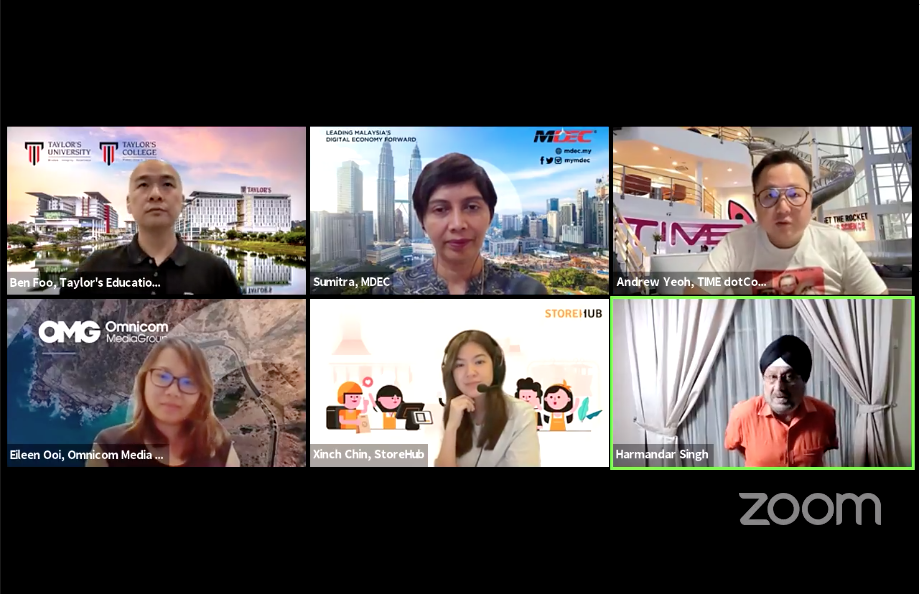The Malaysia Digital Association (MDA) hosted its second Digital Wednesday Fireside Chat on 21 April 2021 to discuss the talent crunch in Malaysia and closing the skills-gap in the digital era.
Aired live on MDA’s Facebook page, the session’s panelists were Vice President and Head of Digital Skills and Jobs, Malaysia Digital Economy Corporation (MDEC), Dr Sumitra Nair; COO, Omnicom Media Group (OMG), Eileen Ooi; Head of Marketing, TIME dotCom, Andrew Yeoh; Group CMO and Digital Transformation Lead, Taylor’s Education Group, Ben Foo and Head of Marketing, Storehub, Xin-Ci Chin.
With the goal of exploring if the talent crunch in Malaysia is real or just a fad talk, the session was moderated by industry veteran, Founder of MARKETING Magazine, Professor Harmandar Singh

In February 2021, Malaysiakini reported that 8 out of the top 10 emerging jobs in Malaysia will require digital tech skills but close to 90% of the workforce in Malaysia believe they do not have the right skills for a digital workplace. On top of that, graduate unemployment rates have also increased due to the lack of digital skills.
After brief introductions of each panelist, the conversation was kicked off with Prof. Ham as he reminded panelists that the objective of the session was to have a casual and honest conversation, taking into consideration all parties’ perspectives.
So is there a talent crunch or is it just a fad?
All five panelists agreed that there is definitely a talent crunch in Malaysia. However, the factors that cause the gap in talent availability, especially in the digital sectors, are multifaceted.
According to Dr Sumitra, based on MDEC’s observations from Malaysia’s top job portals over the last year, the number of jobs vacancies posted had increased by over 20,000 since the start of the pandemic.
However, she explained that most of the jobs advertised on these portals are looking for an experienced professional, most often categorised as mid-level talent.
“70% of the job vacancies are for experienced talents and that’s where we need to focus because that’s where the shortage is”, Dr Sumitra said.
While some agree that Malaysia certainly lacks mid-level experienced talents, Xin-Ci says that in her experience, many mid-level talents do not market themselves the right way too. In her attempt to pinpoint the cause for this mid level talent gap, Eileen rationalized they often express chasing ‘the latest shiny new toy in tech’ mentality & their inherent impatience only accelerates the same.This ushers in an aptitude/skill set gap as well.
Skills such as digital marketing are fairly new as Xin-Ci mentioned that even Facebook Ads were only launched less than two decades ago. Given the exploding rate of digital acceleration globally since then, the digital requirements are quickly changing, requiring mid-level talents to quickly catch up.
What about fresh-grads who grew up in the digital world?
If the talent crunch exists due to a lack of digital proficiency among older candidates, why isn’t the gap filled with fresh graduates who were moulded in a digital environment?
According to Ben’s experience leading the marketing at one of Malaysia’s top private universities, the younger generation entering the workforce expect more control over their career and often want to choose the company they work with and bosses they work with.
“They’re looking to be part of something bigger, a direction and a career road map where they feel like they are going to be appreciated for their skills,” Ben explained.
Eileen pointed out “As leaders, we really need to invest time, take on a parent role and nurture future leaders,” she explained. “Too often, organisations are only focused on hard skills and short-termism.”
Andrew added to Eileen’s point by asking an important question: “Since digital marketing is so new, are employers open minded enough to hire people who don’t have traditional career paths and are more self-learned?”
To this Eileen once again emphasised that organizations need to play the long game and talents need to do the same and once this happens, a required synergy is created.
According to Xin-Ci, the idea of using interviews to assess a candidate’s capabilities should be re-evaluated.
“Interviews are such a poor way of hiring, sometimes,” she said. “Some Malaysians might not be able to explain their thought processes clearly during a verbal interview.”
Professor Ham then asked the panelists if the talent crunch exists partly because there is a hidden pool of capable talents who haven’t gone through the educational process we hold them by.
According to Ben, Taylors University works closely with certain companies to help them identify promising students before they graduate, which has been effective.
To this, Eileen commented that the way organisations market their talent is also one way to close the gap.
“Regardless of skill sets, generally a talent crunch comes from the lack of right aptitude, expectation gaps, short termism and organisations not investing enough in their employees,” Eileen explained. “A candidate’s EQ is arguably more important when hiring and this is something that can be nurtured by the environment they are in.”
Final thoughts
Wrapping up the discussions, Professor Ham asked each panelist to give their final thoughts on whether or not a talent crunch exists in Malaysia and what the biggest obstacle is in fixing it.
“Not just in Malaysia but globally there is a talent crunch in tech because the rate is exploding,” Dr Sumitra said. “In Malaysia, it is the mid level gap and employers must work closely with the academia sector because the sooner they come in, the better.”
She also added that startups who are looking to source for talents within universities but do not have the bandwidth to do so, may reach out to MDEC to serve as a bridge between them.
“It is a whole supply demand and a push and pull factor,” Andrew then added. “There is a bigger systemic revamp we need but in the interim Malaysia should position itself to be known for one thing and appeal to problem solvers to come home and take up a challenge.”
According to Xin-Ci, the biggest obstacle lies in the way Malaysians think of training and upskilling. “Even from an organisation level, training doesn’t just mean sending people to a course, it’s about teaching them how to connect and network and learn on the fly because it is a life-long progresive learning process,” she said.
After each panelist offered their final thoughts, the conversation moved into a short Q&A session. To watch the full discussion including the Q&A segment, click here.
TL;DR: 5 key takeaways:
- The talent crunch that Malaysia is facing today is real and needs immediate attention
- There exists a clear white space between the talent needs of organizations and the skills sets/aptitude that talents today offer.
- Organizations and leaders have a pivotal role to play in order to steer away from the existing ‘get the job done’ short termist outlook towards talents and move towards a long term view of ‘nurturing and building future leaders’ who will add strategic value to the business and the economy
- Employers and organizations must welcome more holistic ways of looking at Malaysia’s talent crunch such as developing non-traditional interview techniques, building EQ centric training programmes and collaborating with the right entities who can make this change happen in a timely fashion
- Continuous learning – lead by talents and employers will dictate the future of this issue as well as the country’s economy
MARKETING Magazine is not responsible for the content of external sites.











